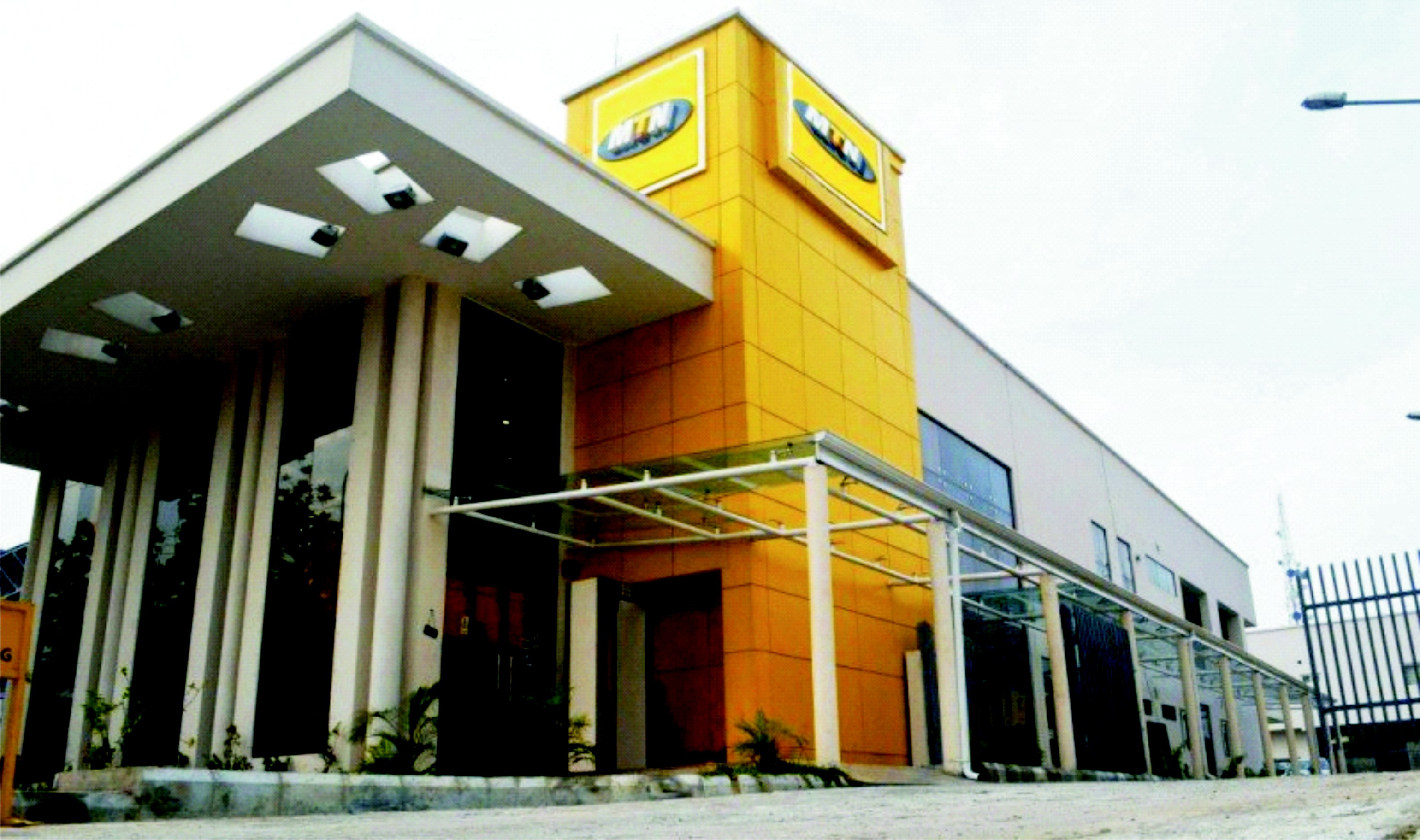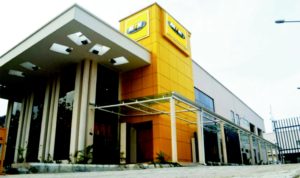MTN has consistently prided itself as the foremost telephone company that is getting Nigerians talking the most. Now the South African company is about to set tongues wagging across networks with revelations that it has routinely been shipping billions of dollars overseas to avoid paying its fair share of tax in Nigeria.
An 11-month-long joint investigation by PREMIUM TIMES, Finance Uncovered and amaBhugane reveals that MTN has been running circles around Nigerian revenue authorities using a complex but noxious tax avoidance scheme called Transfer Pricing.
For any economy, it is a slow death.
The red flag was raised the moment our investigations showed that MTN Nigeria has been making payments to two overseas companies – MTN Dubai and MTN International in Mauritius – both located in tax havens.
It was discovered that in 2013 for example, MTN set aside N11.398 Billion from MTN Nigeria to pay to MTN Dubai. A similar transfer of N11.789 Billion was made by MTN Ghana to the same MTN Dubai, making it a total of N23.187 Billion that was shipped to the Dubai offshore account.
In a rare disclosure in 2013, MTN admitted it made unauthorized payments of N37.6 Billion to MTN Dubai between 2010 and 2013. The transfers were then “on-paid” to Mauritius, a shell company with zero number of staff and which physical presence in the capital Port Louis is nothing more than a post office letter box. The disclosure amounted to a confession given that MTN made the dodgy transfers without seeking approval from the National Office for Technology Acquisition and Promotion (NOTAP), the body mandated to oversight such transfers.
On the basis of an earlier management fees agreement that was technically quashed by NOTAP and on the basis of MTN’s reported revenues, it is estimated that N90.2 Billion could have been transferred out of Nigeria in management fees alone since the company was founded in 2002.
Transfer Pricing!
For corporate organizations determined to escape the taxman but still cleverly staying on the right side of the law, Transfer Pricing is the new cellar door constructed by the most ingenious of accountants. It is a new global disease to which Third World economies are the most vulnerable.
Multinationals employ Transfer Pricing to move their profits offshore, leaving behind a shrinking tax base in their host countries and inexorable cuts to public services.
In Africa, tax avoidance has been named as one of the factors holding the continent back by starving governments of the revenues it needs for development.
A report jointly commissioned by the United Nations and the African Union and drafted by a high level panel led by former South African president Thabo Mbeki considered tax avoidance by multinationals to be an “illicit financial flow” and a significant drain on government resources across the continent.
In total illicit financial flows, which included corruption and the proceeds of crime, were determined to be costing the continent $50 Billion a year $50bn.
Just last year, South Africa’s deputy president Cyril Ramaphosa had harsh words for tax dodgers. He said: “Tax evasion is not only a crime against the state; it’s also a crime against the people of our country, ordinary people.”
Curiously, the same Cyril Rhamaposa was non-executive chairman of the board of MTN between 2001 and 2013 before he became South Africa’s No.2 man. In effect, the same tax practices which the deputy president strongly condemned in his country as financial crime is vigorously being promoted in Nigeria.
MTN is the largest cell phone company in Africa with 227.5 million subscribers. The company, which operates in more than 20 countries across Africa and the Middle East, has Nigeria as its biggest operation.
Until now, tax justice investigations had focused on computer giants, corporations in the extractive industry, food and beverages; in fact everywhere but the mobile phone sector despite the cell phone industry in Africa being one of the largest and most important industries for the continent.
Mobile phone has been a cheap and quick way of rolling out the vital communications infrastructure that has underpinned Africa’s growth story over the last decade. As a result the industry has seen explosive growth. With 685million mobile phone users in Africa, the success story means that cell phone companies are now the largest contributor to government revenues in many African countries. That is when they pay their fair share of taxes.
Artificial operating costs!
To pay little or no tax, companies determined to cheat begin by seeking ways to create artificial operating costs in the country where they operate. For example, a company is in Nigeria but has a parent or subsidiary company in another country. It makes huge profit but decides to declare a much lower profit-before-tax. To achieve this, it pays the parent and/ or subsidiary company for services not rendered and ships cash to them. Where services are rendered, the costs are inflated. Such services may include royalty for the use of brand name, procurement services, technical services and management services.
Typically, the recipient company is located in an offshore territory under a different financial jurisdiction. MTN has a substantial network of subsidiaries in offshore tax havens, including the British Virgin Islands, Dubai and Mauritius.
Because of the growing concerns that multinationals are using intra-company trading to shift profits around the world by overcharging for services delivered or in more extreme cases by creating artificial transactions where no services was rendered at all, respective countries have a maximum percentage of profits it can allow companies to pay out as management fees.
For example, in Senegal, accounts from the company Sonatel show that the company has a ‘cooperation agreement’ with parent company France Telecom that is capped at 1.43% of revenue.
Until 2010 MTN Nigeria had an agreement with MTN Dubai to pay 1.75% of revenues to the company for management, and royalties for the use of the MTN trademark. Nigeria requires that management fees paid by multinationals are approved by the National Office for Technology Acquisition and Promotion (NOTAP). The fee payments had been reversed following a failure to come to a new agreement on management fees with Nigerian regulators.
MTN’s previous agreement with NOTAP expired in 2010.
Notwithstanding, MTN has continued to make payments overseas. When we sent questions to MTN over these unauthorized payments, the company told us that this was because they expected NOTAP to approve a new deal and backdate it to the date of the expiry of the previous deal.
MTN’s financial activities are now being questioned by more than one tax authorizes in Africa.
In Ghana the MTN subsidiary, Scancom, has been paying vast management fees to companies located offshore. Our investigations reveal that Scancom paid 758m GHS in management and technical fees to MTN Dubai between 2008 and 2013. This was 9.64% of the company’s revenue. Normally the maximum fee level allowed in Ghana is 6%.
We can reveal that the high levels of fees attracted the attention of Ghana’s intelligence services, which launched an investigation into “economic fraud” between 2012 and 2013.
MTN’s management fees need approval from the Ghana Investment Promotion Centre (GIPC). The Ghanaian “National Security Taskforce” has called for a “review of all technology transfer and management service agreements currently held by GIPC to remove sections which are inapplicable and wrongly provided for” and upgrading and training of state systems and staff.
In response to this, MTN in Ghana told us: “The technical and management services agreements between Scancom and Investcom were duly approved by the GIPC.”
The current head of the GIPC is Mrs. Mawuena Trebarh, who between 2007 and 2012 was responsible for government relations at MTN Ghana. This reporting team asked Mrs Trebarh to comment on whether her previous role could be perceived a conflict of interest. She did not respond to our requests.
In response to our enquiries MTN confirmed that the company paid 12 billion West African Francs in 2012 and 14 billion West African Francs in 2013 in management fees to MTN International. The figure for 2013 is equivalent to 5% of the revenue made by MTN in Cote d’Ivoire.
Dubai paradox!
Dubai is one of the places MTN ships huge profits to. Meanwhile, MTN does not operate any mobile phones in Dubai, yet it has significant operations in the small city state.
MTN told us that it employs around 115 people in Dubai who provides services to the MTN group such as group procurement, group finance, legal services, human resources and other corporate functions.
One tool that campaigners have said will be helpful is to look at company reporting on a country by country basis. If a company is making huge revenues in a country where it has few employees but there is a low tax rate, which would suggest that there may be some profit shifting taking place.
In Uganda, a dispute between the Uganda Revenue Authority and MTN has revealed that the company is paying 3% of its turnover in management fees to MTN International.
The fees have been challenged by the Uganda Revenue Authority (URA) who issued MTN with a “notice of assessment” in 2011. This was for a number of tax issues between 2003 and 2009, but a large portion was to do with a dispute over management fees, most of which had been paid to Mauritius.
Correspondence between the URA and MTN seen by us show that the URA questioned the legitimacy of these fees, and pointed out that MTNI, the company providing “management services” to MTN Uganda had not spent any money in the years they had looked into. The URA said this could only mean two things: that management services provided to MTN Uganda had either already been paid for by MTN Uganda (and so MTN was in effect charging twice for the same thing) or they were never provided at all.
The Ugandan authority told the company: “We have repeatedly asked for evidence of specific work performed by MTN Group for MTN Uganda for each of the tax years 2003 to 2009. We have only been provided with very little information relating to 2009 and the latter years. This information is very far from justifying a payment of 3 per cent of MTN Uganda’s turnover as management fees.”
NOTAP keeps mum!
Asked to confirm the amount of fees paid out to MTN Dubai and Mauritius based on the company’s reported revenue between 2002 and today, MTN told PREMIUM TIMES: “There is no disclosure obligation for this information in South Africa or Nigeria.”
Asked to explain the possible justification for MTN Nigeria to pay fees for management and technical services to a company with no employees, MTN said: “It is the contracting party’s prerogative as to how it elects to discharge its contractual obligations.”
Meaning is that MTN Mauritius can perform its task without a single staff member.
PREMIUM TIMES made sustained efforts to get NOTAP and the Federal Inland Revenue Service (FIRS) to comment on the MTN practices in Nigeria.
The Director in charge of Technology Transfer and Agreement, Ephraim Okejiri, initially pleaded that he was in a meeting, and that the reporter should wait.
But after over four hours of waiting, he sent a secretary to say he would not be able to give any information on MTN.
Similarly at Nigeria’s tax agency, the Federal Inland Revenue Service, the Director of Public Communications, Emmanuel Obeta, who had earlier promised on three occasion to make information available on the matter suddenly had a change of mind.
He said relevant officials who should provide him with the information sought were all not available.
Culled from Premium Times


